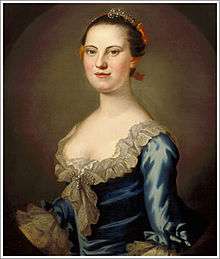Mary Willing Byrd
| Mary Willing Byrd | |
|---|---|
 Portrait by John Wollaston; original in the collection of the Virginia Historical Society, Richmond | |
| Born | September 10, 1740 |
| Died |
March 1814 (73 years old) Westover Plantation |
| Parent(s) | Charles Willing |
| Relatives |
Edward Shippen (grandfather) Peggy Shippen (first cousin) |
Mary Willing Byrd (September 10, 1740 – March 1814) was the second wife of Colonel William Byrd III,[1] a Colonial American military officer at the time of the American Revolution and son of the founder of Richmond, Virginia.[2] Her father, Charles Willing, was the mayor of Philadelphia from 1748 to 1754, and her great-grandfather, Edward Shippen, was the second mayor of Philadelphia, from 1701 to 1703.
In 2007 Byrd was posthumously honored by the Library of Virginia's "Virginia Women in History" program.[3]
After her husband committed suicide in January 1777, leaving considerable debts, she managed his plantations, including Westover Plantation, in Charles City County.[3]
Although Byrd had many ties to the British and Loyalists during the American Revolution, she tried to remain neutral and to preserve her children's inheritance. After trying to recover property that had been seized by the British, she was charged in 1781 with trading with the enemy. Byrd defended herself eloquently in a letter to Governor Thomas Jefferson: "I wish well to all mankind, to America in particular. What am I but an American? All my friends and connexions are in America; my whole property is here—could I wish ill to everything I have an interest in?"[4] Her trial was first postponed and ultimately never held.
Children
Mary Willing Byrd had ten children:
- Maria Horsmanden Byrd
- Evelyn Taylor Byrd
- Charles Willing Byrd (died as child)
- Abby Byrd
- Anne Willing Byrd
- William Boyd Byrd
- Charles Willing Byrd
- Dorothy Byrd (died as child)
- Jane Byrd
- Richard Willing Byrd.
Further reading
- John T. Kneebone et al., eds., Dictionary of Virginia Biography (Richmond: Library of Virginia, 1998- ), 2:457-459. ISBN 0-88490-199-8.
- "The Will of Mrs. Mary Willing Byrd, of Westover, 1813, with a List of the Westover Portraits". The Virginia Magazine of History and Biography. 6 (4): 346–358. 1899. JSTOR 4242183.
References
- ↑ Royster, Charles (2010). The Fabulous History of the Dismal Swamp Company: A Story of George Washington's Times. Vintage. ISBN 9780307773296. Retrieved 3 March 2015.
- ↑ Bearss, Sara B. "Mary Willing Byrd (1740–1814)". Encyclopedia Virginia. Retrieved 3 March 2015.
- 1 2 "Virginia Women in History: Mary Willing Byrd (1740-1814), Charles City County, Planter". Library of Virginia. Retrieved 3 March 2015.
- ↑ Julian P. Boyd et al., eds., The Papers of Thomas Jefferson (1950– ), 4:691.
External links
- Westover Plantation
- Mary Willing Byrd at Find a Grave
- Sale of property by Mary Willing Byrd
- Thomas Jefferson, letter to Mary Willing Byrd, October 24, 1779
- Mary Willing Byrd, portrait by John Wollaston